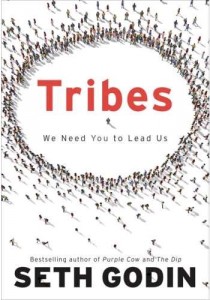This past weekend I had the opportunity to read Tribes by Seth Godin. Everyone I know has been talking about it and I wanted to check it out. I picked it up after dinner Saturday evening and finished it before bed. I’m a pretty fast reader, but it was a super easy read full of great stuff for leaders. I have always enjoyed Godin’s book. Mostly because he states the obvious, but he does it in such a way that activates the reader to take hold of that and run with it towards the goal they are chasing.
At the end of the book Godin asks the reader if they got anything out of the book or took any notes to please pass those along. He encourages those who are convinced to lead tribes, to spread the word. So…that is what I am doing. All of the statements written below are Seth Godin’s. These are the things I underlined. Good stuff…I pray it will be a resource to you regardless of the kind of leader you are. There was a ton in here that challenged me in the ministries that I lead.
Even with these notes, I encourage you to pick up your own copy and check it out. This is a great book to share with someone else you know that wants to grow as a leader.
• A tribe is a group of people connected to one another, connected to a leader, and connected to an idea.
• A group needs only two things to be a tribe: a shared interest and a way to communicate.
• The real power of tribes has nothing to do with the Internet and everything to do with people. You don’t need a keyboard to lead…you only need the desire to make something happen.
• Generous and authentic leadership will always defeat the selfish efforts of someone doing it just because he can.
• We live in a world where we have the leverage to make things happen, the desire to do work we believe in, and a marketplace that is begging us to be remarkable.
• Skill and attitude are essential. Authority is not. In fact, authority can get in the way.
• There’s a difference between telling people what to do and inciting a movement.
• Crowds are interesting, and they can create all sorts of worthwhile artifacts and market effects. But tribes are longer lasting and more effective.
• “Good enough” stopped being good enough a long time ago. So why not be great?
• A true fan connects with other true fans and amplifies the noise the artist makes.
• Instead of always being on the hunt for one more set of eyeballs, true leaders have figured out that the real win is in turning a casual fan into a true one.
• The tactics are irrelevant, and the technology will always be changing. The essential lesson is that every day it gets easier to tighten the relationship you have with the people who choose to follow you.
• Whatever the status quo is, changing it gives you the opportunity to be remarkable.
• In unstable times, growth comes from leaders who create change and engage their organizations, instead of from managers who push their employees to do more for less.
• We choose not to be remarkable because we’re worried about criticism.
• Challenging the status quo requires a commitment, both public and private. It involves reaching out to others and putting your ideas on the line. (Or pinning your Ninety-five Theses to the church door.)
• It’s nice to get paid. It’s essential to believe.
• Great leaders are able to reflect light onto their teams, their tribes. Great leaders don’t want the attention, but they use it. They use it to unite the tribe and to reinforce its sense of purpose.
• A tribe that communicates more quickly, with alacrity and emotion, is a tribe that thrives.
• Nothing online is even close to a substitute for the hard work and generosity that comes from leadership. But these tools make leadership more powerful and productive, regardless of who’s in your tribe.
• Leading someone toward giving up one worldview and embracing yours isn’t easy and it’s not always comfortable.
• Leadership is a choice. It’s the choice to not do nothing.
• Change isn’t made by asking permission. Change is made by asking forgiveness, later.
• Leaders who set out to give are more productive than leaders who seek to get.
• The art of leadership is understanding what you can’t compromise on.
• If religion comprises rules you follow, faith is demonstrated by the actions you take.
• Leaders, on the other hand, don’t have things happen to them. They do things.
• The secret is realizing that wrong isn’t fatal.
• The secret of leadership is simple: Do what you believe in. Paint a picture of the future. Go there. People will follow.
• Leadership is very much an art, one that’s accomplished only by people with authentic generosity and a visceral connection to their tribe.
• Hope without a strategy doesn’t generate leadership.
• Caring is the key emotion at the center of the tribe.
• Listen, really listen. Then decide and move on.
• Part of leadership (a big part of it, actually) is the ability to stick with the dream for a long time. Long enough that the critics realize that you’re going to get there one way or another…so they follow.
• Credit isn’t the point. Change is.


